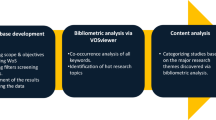Abstract
With the advent of the new Information and Communication Technologies (ICTs), and the accelerated development of the urban centres, a debate arose on how to use ICTs in order to improve the development of cities in order to make them “intelligent”, what the doctrine has been calling smart cities - SC. Having this in consideration, this paper aims to search for the existence of studies analysing indicators for smart cities. The operationalisation of this work followed the structure of an original paper and focused in bibliometric and systemic analysis. This kind of work is useful as guideline for the development of projects, indicating new trends for future research and identifying the methods of research used in each area. From the research that was done it may be verified that studies referring indicators for smart cities are rather incipient, and for that reason it may be foreseen an opportunity for the development of new researches.
Access this chapter
Tax calculation will be finalised at checkout
Purchases are for personal use only
Similar content being viewed by others
Notes
- 1.
It must be referred that this step of the current study was operated with the precious help of Maria Cristina Fernando Gonçalves, the person in charge of the Documentation Services at Universidade do Minho.
References
Denhardt, J.V., Denhardt, R.B.: The New Public Service: Serving, Not Steering. M.E. Sharpe, New York (2003)
Denhardt, R.B.: Teorias da administração pública. Cengage Learning, São Paulo (2012). (in Portuguese)
Salm, J.F., Menegasso, M.E.: Os modelos de administração pública como estratégias complementares para a coprodução do bem público. Revista de ciências da Administração 11(25), 97–114 (2009). (in Portuguese), set/dez
Calderón, C., Lorenzo, S.: Open Government: Gobierno Abierto. Algón Editores, Jaén (2011)
Carta Ibero-Americana de Governo Aberto (in Castillian). http://www.secretariatransparencia.gov.co/estrategias/Documents/carta-iberoamericana-gobierno-abierto.pdf. Accessed Sept 2016
Brandsen, T., Pestoff, V.: Co-production, the third sector and the delivery of public services. Public Manag. Rev. 8(4), 493–501 (2006). http://dx.doi.org/10.1080/14719030601022874. Accessed Sept 2016
Schommer, P.C., et al.: Accountability and co-production of information and control: social observatories and their relationship with government agencies. Revista de Administração Pública, Rio de Janeiro 49(6), 375–1400 (2015). http://www.scielo.br/scielo.php?script=sci_arttext&pid=S0034-76122015000601375&lng=en&nrm=iso. Accessed Oct 2016
Van Bastelaer, B.: Digital cities and transferability of results. In: Proceedings of the 4th EDC Conference on Digital Cities, Salzburg, pp. 61–70, 29–30 October 1998
Giffinger, R.: Smart Cities. Ranking of European medium sized cities. Centre of Regional Science: Viena UT (2007). http://www.smart-cities.eu/download/smart_cities_final_report.pdf. Accessed Oct 2016
D’Ancona, M.A.: Metodologia Cuantitativa. Estrategias y Tecnicas de Investigación Social. Sintesis, Madrid (1999)
Blazquez, P.G.: Medir em las ciências sociales. In: Fernando, M., Alvira, F., Ibanez, H. (eds.) El análisis de La realidad social. Métodos y técnicas de investigación, pp. 343–407. Alianza Editorial, Madrid (2000)
Arias, C.G.: Sistemas de indicadores de Smart Cities. In: XII Congreso Español de Ciencia Política y de la Administración (2015). http://www.aecpa.es/uploads/files/modules/congress/12/papers/1139.pdf. Accessed Sept 2016
Vanti, N.A.P.: Da bibliometria à webometria: uma exploração conceitual dos mecanismos utilizados para medir o registro da informação e a difusão do conhecimento 31(2), 369–379 (2002). http://dx.doi.org/10.1590/S0100-19652002000200016. Accessed Sept 2016
Sampaio, R.F., Mancini, M.C.: Estudos de revisão sistemática: um guia para Síntese criteriosa da evidência científica. Revista Brasileira de Fisioterapia, São Carlos 11(1), 83–89 (2007)
Santos, P.M., Selig, P.M.: Indicadores para o novo serviço público: uma análise bibliométrica e sistêmica. Perspectivas em ciencias da informação, Belo Horizonte 19(3), 82–97 (2014). http://www.scielo.br/scielo.php?script=sci_arttext&pid=S1413-99362014000300005&lng=en&nrm=iso. Accessed Sept 2016
Lazaroiu, G.C., Roscia, M.C.: Definition methodology for the smart cities model. Energy 47, 326–332 (2012). Elsevier
Monfaredzadeh, T., Berardi, U.: Beneath the smart city: dichotomy between sustainability and competitiveness. Int. J. Sustain. Build. Technol. Urban Dev. 6, 140–156 (2015). Taylor & Francis
Acknowledgments
Our thanks to the CAPES Foundation, Ministry of Education of Brazil, for financing this research, and also to the CIIDH-Interdisciplinary Research Center in Human Rights, and to the Algoritimi Centre, both at University of Minho, for supporting this research. The work of Marciele Berger has been supported by CAPES under Grant nr. BEX - 1788/15-9.
Author information
Authors and Affiliations
Corresponding author
Editor information
Editors and Affiliations
Rights and permissions
Copyright information
© 2017 Springer International Publishing AG
About this paper
Cite this paper
Bernardes, M.B., de Andrade, F.P., Novais, P. (2017). Indicators for Smart Cities: Bibliometric and Systemic Search. In: Rocha, Á., Correia, A., Adeli, H., Reis, L., Costanzo, S. (eds) Recent Advances in Information Systems and Technologies. WorldCIST 2017. Advances in Intelligent Systems and Computing, vol 569. Springer, Cham. https://doi.org/10.1007/978-3-319-56535-4_10
Download citation
DOI: https://doi.org/10.1007/978-3-319-56535-4_10
Published:
Publisher Name: Springer, Cham
Print ISBN: 978-3-319-56534-7
Online ISBN: 978-3-319-56535-4
eBook Packages: EngineeringEngineering (R0)




